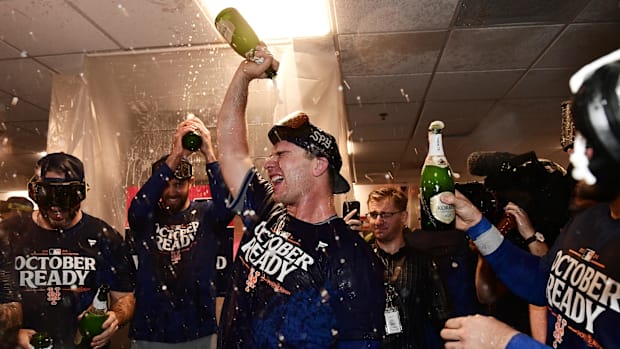
Very rarely, when winter weather conditions get frighteningly aligned, cold, dry air traveling from the north and warm, moist air coming from the tropics crash like freight trains on a single track. Atmospheric pressure drops dramatically, and a winter storm blows up into a “once in a generation” monster. The scientific term for this phenomenon is bombogenesis.
Without the torrents of snow and wind, but with requisite force and suddenness, a bombogenesis struck American Family Field in Milwaukee Thursday night. This time it was a once in a generation home run—by a polar bear, no less.
Like bomb cyclones and Yankees slugger Giancarlo Stanton, New York Mets first baseman Pete Alonso gives no fair warning of when he’s about to go off.
He can drop a foul pop-up like a Little Leaguer one minute, as he did in Game 3 of the National League wild-card series against the Milwaukee Brewers, and hit one of the biggest home runs in Mets history the next.
He can go 12 days without an extra-base hit, as he did when he stepped to the plate with the Mets down two runs and down to the last two outs of their OMG season, and 92 days without a home run off a changeup, and still hit one out against one of the nastiest pitches in the game, the Airbender of Milwaukee Brewers closer Devin Williams.
Alonso plays baseball without style, subtlety or grace. He strikes out too much. He’s not fast. His play at first base recalls the nickname Lonnie Smith earned for how he played left field: Skates. Every time he must complete a 3–1 with the pitcher is a Wes Craven movie waiting to happen.
But what Alonso does about as well as anyone is change games with one swing. One swing that often comes out of nowhere, like his gigantic one to win Game 3, 4–2, that sent the Mets to Philadelphia for the NLDS. No matter the slump, or how ugly his last swing looked, Alonso is always one swing away from changing a game.
Going into his at-bat against Williams, Alonso was in a 5-for-38 funk (.132) with no extra base hits and 18 strikeouts. With runners at first and third, a double play would have ended the Mets’ season. Alas, grounding into double plays is part of his game, too. He grounded into one 68 times over the past four years, seventh most in baseball.
Alonso, taking all the way, looked at a first-pitch changeup over the heart of the plate. Williams missed badly with two fastballs and then missed inside with a changeup. Now the count was 3-and-1 and Williams needed to throw a strike. He decided on his best pitch, his changeup. Of course.
The Airbender is so nasty that Williams had thrown 290 of them since Sept. 1, 2023 without giving up a home run. It has so much depth and run that it’s nigh impossible to lift. Alonso seemed an unlikely candidate to do so. He had not hit a home run off a changeup since June 28. His last one before that was in April.
Needing something in the zone, Williams aimed too much into the fat of the strike zone. Alonso, yet to swing the bat in the sequence, pounced. Bat met ball like cold, dry air smashing into warm, moist air. The perfect ingredients for bombogenesis.

No one knows where Alonso will be playing next year. You can believe, if you are the sentimental type, his home run not only earns him a hallowed place in Mets lore but also a big, fat new contract from owner Steve Cohen. But the business of baseball is more cold-hearted than that. The Mets once let Ray Knight walk after he was MVP of the 1986 World Series.
Alonso may have a market limited by the contracts of Matt Olson ($168 million) and Freddie Freeman ($162 million) and the bias of analytic-minded front offices when it comes to paying for a slugger aging into his 30s without top baserunning or defensive skills who is coming off the worst slugging season of his career (.459). But he showed in Game 3 why he is so valuable. The guy hits 40 home runs or so rolling out of bed. He changes games in an era when the home run ball has become more valuable.
And now the Mets look more and more like the 2023 Texas Rangers. Texas blew the division title on the last day of the season. They had to go from Anaheim to Seattle to Tampa Bay (wild-card series) to Baltimore (divisional series) before they returned home 14 days after they left. The grind was the best thing to happen to them. They won the World Series by going undefeated on the road.
The Rangers bonded over so much time together on the road playing (and winning) big games. The bigger the challenge, the bigger the reward. Now it is the Mets who are being rewarded with jet propulsion forward from a 14-day, three-city, 3,553-mile, two-champagne celebration, one-hurricane trip: New York to Atlanta to Milwaukee to Atlanta to Milwaukee to Philadelphia to New York. The Mets, Royals and Tigers are all proving this month that emotions and intangibles become bigger factors in the postseason.
Alonso became a playoff legend Thursday night. October lore is filled with such swings—not just game-winning home runs but the bomb cyclones of homers. The ones that come out of nowhere. Bill Mazeroski off Ralph Terry. Kirk Gibson off Dennis Eckersley. Travis Ishikawa off Michael Wacha. Rajai Davis off Aroldis Chapman. Tom Lawless off Frank Viola.
This was another in the manner of that phenomenon. Williams just doesn’t give up home runs—just six of them out of 2,325 changeups in his career until that one. Alonso was ice cold. Turns out, it was the perfect storm.









